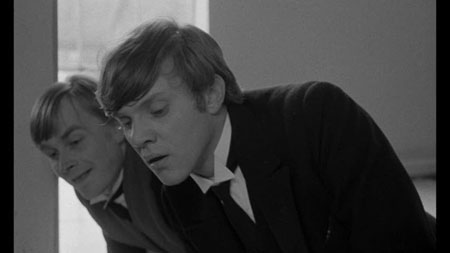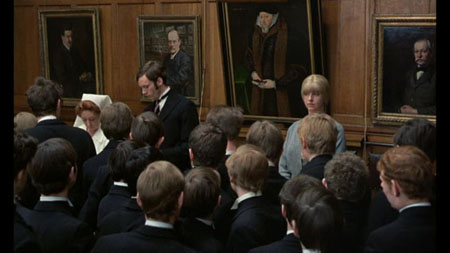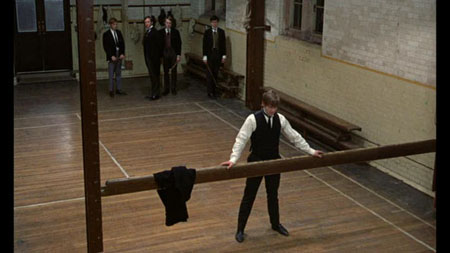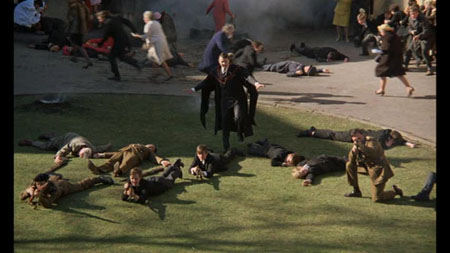 BUY IT AT AMAZON: CLICK HERE!
BUY IT AT AMAZON: CLICK HERE!
STUDIO: Criterion Collection
MSRP: $39.95
RATED: R
RUNNING TIME: 112 Minutes
SPECIAL FEATURES:
• Audio Commentary by David Robinson and Malcolm McDowell
• A 2003 episode from the Scottish TV Series Cast and Crew
• New interview with Graham Crowden
• Thursday’s Children (1954), an Academy-Award winning documentary.
• Booklet featuring pieces by critic David Ehrenstein, screenwriter David Sherwin, and director Anderson
The Pitch
“A satire about British boys boarding schools that ends in bullets and bloodshed? That’s just good, wholesome entertainment there!”
The Humans
Malcolm McDowell, David Wood, Richard Warwick, Christine Noonan, Rupert Webster
The Nutshell
There may be no form of authority more menacing than that behind the English boys boarding school. It’s a cruel, unforgiving world, one marked by casual sexual sadism and soul-crushing conformity. In this world, tradition and honor are the enemies. Their greatest foe: Mick Travis, a senior fed up with the system that schools him. He’s got a plan to trump authority, but a whole hell of a lot of people may have to die in the process.
Goodbye, Mr. Chips, this is not.

"How does he shave in that?"
The Lowdown
For whatever reason, I think I gravitate towards the forgotten flicks, the ones that get left by the wayside. Case in point: I’ve wanted to see If….since I was ten years old, a fan of director Anderson’s great surrealist musical O Lucky Man. However, in this country, a satire about high school kids that ends in horrible violence is only slightly less hard to find on VHS and TV than a straight guy in Chelsea. Now, eleven years later, I finally have my chance.
And Oh My Stars, is it worth the wait.
This flick is a dazzling, shocking, hilarious, bizarre, scary, and completely entertaining slice of cinema. I’ve watched it twice since I got the DVD, and I feel a third viewing may be in order. It’s the kind of flick you want to show to all your friends. The kind they’d better appreciate or else…well…maybe you should find some new friends. Above all else, it’s a triumph for director Anderson and star McDowell. Together, they succeed in taking a Swiftian conceit and making something far more resonant and interesting.
You can read this film so many different ways. It’s a pitch-perfect look at life in a boys’ school, maybe the most accurate one ever made. It’s the all the turbulence and unrest of the sixties, viewed in microcosm. It’s a psychological study of madness. It’s a satire on man’s gravitation to violence. Choose your own adventure here; there are no wrong answers. Anderson throws it all out on screen, and his style is one of the film’s strengths. There’s no mocking of conventions or tone here, with regard to the British boarding school—he plays it completely straight, shooting many scenes in a pseudo-documentary style. One of the pleasures here is seeing all the details of boys’ school that he gets absolutely right. As an ex-prisoner myself, it was downright cathartic to process the little bits here and there, from the homophobic homo eroticism, to the arrogant bitterness of the administration, to the small bands of students that begin to resemble lifeboats in a big sea after a while.
All the while, Anderson’s laying down surrealist touches to prepare us for the ending. We get odd, often sexually charged non sequiturs (the scene in town, or the lone sympathetic headmaster being led to bed), jump-cut editing, and, most notably, film stock shifts from black and white to color and back again, sometimes multiple times in just a few seconds. Word has it this was a fluke, that budgetary concerns necessitated the use of black and white film. If so, then bully on it, because it acts as a nice, subtle way of keeping us off-balance. Seemingly ordinary events take on other meanings when shifted back and forth between color and black and white, and nothing is as it appears.

Which of these things is not like the other?
That goes double for the violent conclusion. By this time, all bets are off, both in terms of plot and reality, and Anderson does a curious thing; he stylizes the brutality by making it flat and deliberately unrealistic. Mick and his “troops” blast away at their school with mortars and machine guns, and yet there is very little blood. We’re denied the graphic shock and kinetic punch of the attack, removing us from the chaos and putting us in Travis’ corner even further. He’s our “hero,” and look how little actual damage he’s doing! Surely he can’t be all that bad! He’s dashing, we love him, and we celebrate his actions, which makes them so much disturbing—Anderson’s forcing us to question our own responses to violence, and why we find it so glamorous.
That’s a lot to process all at one. It helps to have a lead as charismatic as McDowell. Apparently, his Mick Travis made Stanley Kubrick stop and say, “That’s Alex DeLarge.” Looking at McDowell here, you know exactly why. Travis and DeLarge are not the same character, but they could be spiritual siblings, railing out against the worlds, their methods and motives suspect. And McDowell is absolutely riveting here. This isn’t a star showcase like A Clockwork Orange; If….is definitely more of an ensemble piece, and the whole cast is great, but McDowell wrests away your attention every minute he’s on screen. He’s capable of great violence, but he’s so damned funny and sharp you’re with him the whole way. Whatever tonal shifts the flick makes, you power through them because you believe in McDowell’s work. It’s powerful work, and it makes you wish he got work this good more often (and no, I don’t think Rob Zombie’s Halloween will be that work).
By the final frame, as McDowell triumphantly blasts away into the camera (at us!), he’s brought us through the looking glass completely. And man, what a place it is.
Now just go see it.

"Huh huh, we’re gonna rape him. I love being British and rich."
The Package
This is a hard one to rate in terms of picture quality; If…. was shot with cameras and film stocks of wildly varying quality. Sometimes it looks great. Sometimes…not so much. But because I love this flick, I’m willing to cut it some slack and say that the shifts in film quality probably represent the tonal shifts between realism and surrealism and are completely intentional. The sound is its original mono. It’s good, but nothing special. The box gives you Malcolm McDowell, in all his glory. Drink it up.
This is a Criterion disc. It’s not packed to the gills with features, but the ones it’s got are pretty terrific.
On the first disc, the major feature is a terrific commentary with McDowell and critic/historian David Robinson. Robinson does a terrific job of contextualizing the flick, while McDowell is just a treat to listen to and has many memories of working on the flick. Over on disc two, we get a forty-five minute-long episode of Cast and Crew that focuses on If….and has some good archival footage of (late) director Anderson. The interview with Crowden (the History Teacher in the film) is amusing, if a bit too precious; he’s one of those delightfully witty older Brits, and between him and Peter O’Toole in Venus, I’m getting bushed. Thursday’s Children is an early documentary on deaf children from Anderson, and it’s notable for two reasons. 1) You can definitely see where the documentary influence in If….comes from, and 2) It’s got a surprising tenderness mostly lacking in the main feature. When you finish all that, you’ve still got the complimentary booklet that Criterion spoils us with. It’s good stuff here, and mostly worth your time.
I love this film. It premiered in 1969, and in 2007 it’s still relevant, but it makes its points in an entertaining and surreal fashion. The DVD is a little light for Criterion, but what it’s got is damn good. Let’s go with a:

"Goddamn it, would it kill you all to act a little more magical, given the circumstances?"